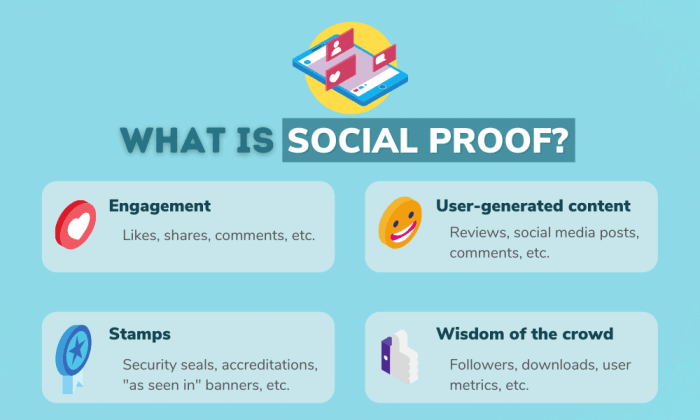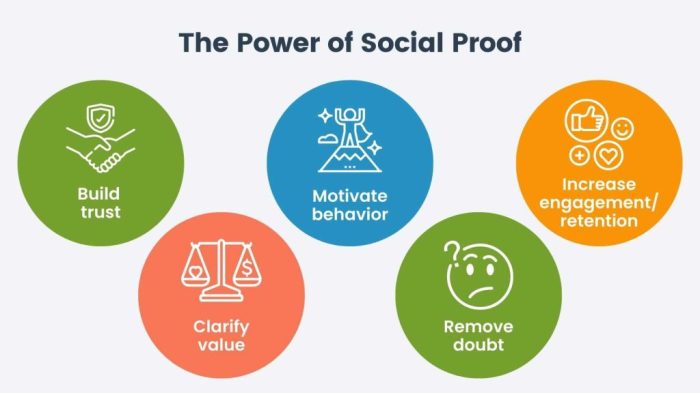Social Proof Strategies are the secret sauce to winning over customers and standing out in the crowded market. From testimonials to influencer endorsements, get ready to dive into the world of social proof and revolutionize your marketing game.
In this guide, we’ll explore the different types of social proof, how to implement them effectively, and measure their impact on your business success. So buckle up and get ready for a wild ride!
Introduction to Social Proof Strategies
Social proof in marketing is like when you see a bunch of peeps buying a certain product or service, and it makes you wanna jump on the bandwagon too. It’s basically using other people’s actions to influence your own decisions. Sneaky, but effective.Social proof is hella important for businesses ‘cause it builds credibility and trust with customers. When folks see others raving about a brand or product, they’re more likely to believe in its awesomeness and give it a try.
It’s like having a whole squad backing you up in the popularity game.
Examples of Social Proof Strategies
- Customer Testimonials: When satisfied customers share their positive experiences, it shows potential customers that your product or service is legit.
- Online Reviews: Sites like Yelp or Amazon reviews give peeps a peek into what others think about your biz, helping them decide if they wanna roll with you.
- Influencer Endorsements: When cool influencers or celebs rep your brand, their followers are more likely to follow suit ‘cause, well, they wanna be like their idols.
- Social Media Mentions: When peeps share their love for your brand on social media, it spreads like wildfire and attracts more peeps to check you out.
Types of Social Proof: Social Proof Strategies

Social proof comes in various forms, each with its own unique impact on consumer behavior. Let’s explore and compare these different types of social proof.
Testimonials
Testimonials are personal recommendations or reviews from satisfied customers. They are effective because they provide real-life experiences that can influence potential buyers. For example, a skincare company may display testimonials from customers who saw significant improvements in their skin after using their products.
Case Studies
Case studies are in-depth analyses of how a product or service helped a specific customer solve a problem or achieve a goal. They are highly effective as they demonstrate the tangible benefits of a product or service. For instance, a software company can showcase a case study detailing how their software streamlined operations for a client, resulting in increased efficiency and cost savings.
Influencer Endorsements
Influencer endorsements involve celebrities or well-known individuals promoting a product or service to their followers. This type of social proof is powerful due to the influencer’s credibility and reach. For example, a popular fashion influencer collaborating with a clothing brand can significantly impact consumer behavior by showcasing the brand’s latest collection to their loyal followers.
Comparison Charts
Comparison charts highlight the features and benefits of a product or service compared to competitors. They are effective as they help consumers make informed decisions based on direct comparisons. For instance, a tech review website can create a comparison chart showing how different smartphones stack up against each other in terms of performance, camera quality, and price.
Wisdom of the Crowd
The wisdom of the crowd refers to the collective opinions or actions of a large group of people. This type of social proof is powerful as it demonstrates widespread acceptance or popularity. For example, a restaurant displaying a “Best Seller” label next to a particular dish can influence diners to choose that option based on the crowd’s preference.
Implementing Social Proof Strategies

When it comes to incorporating social proof into your marketing campaigns, there are some key best practices to keep in mind. Social proof can be a powerful tool to build trust and credibility with your audience, but it needs to be used strategically to be effective.One important tip is to collect a variety of social proof types, such as customer testimonials, reviews, case studies, and social media mentions.
This will help you showcase a diverse range of positive experiences with your brand, building a strong foundation of trust with potential customers.To showcase social proof effectively, consider placing it prominently on your website, social media profiles, and in your email marketing campaigns. Highlighting social proof in key touchpoints can help reinforce your brand’s credibility and influence purchasing decisions.Leveraging social proof across various marketing channels is essential for reaching a wider audience.
Make sure to tailor your social proof to fit the specific platform you’re using, whether it’s through user-generated content on social media or detailed case studies on your website. By integrating social proof seamlessly across channels, you can maximize its impact and build a strong reputation for your brand.
Measuring the Impact of Social Proof
Understanding the impact of social proof on your business is crucial for optimizing your marketing strategies and increasing conversions. By tracking key metrics and analyzing data, you can effectively measure the effectiveness of your social proof efforts.
Key Metrics to Track
- Conversion Rate: Measure the percentage of visitors who take a desired action after being exposed to social proof.
- Engagement Metrics: Monitor the level of interaction and engagement with social proof elements on your website or social media platforms.
- Customer Acquisition Cost: Calculate how much it costs to acquire a new customer through social proof compared to other marketing methods.
Tools and Methods for Analysis
- Google Analytics: Utilize this powerful tool to track the performance of social proof elements and their impact on website traffic and conversions.
- A/B Testing: Conduct experiments to compare the effectiveness of different social proof strategies and determine which ones produce the best results.
- Social Listening Tools: Monitor social media conversations and mentions to gauge the influence of social proof on brand perception and customer behavior.
Case Studies of Successful ROI Measurement, Social Proof Strategies
- Company X: Implemented customer testimonials on their product pages and saw a 20% increase in conversions within the first month.
- Company Y: Used social proof in their email marketing campaigns and achieved a 15% lift in click-through rates and a 10% increase in sales.
- Company Z: Leveraged influencer endorsements on social media, resulting in a 30% boost in brand awareness and a 25% rise in online sales.
